Diplomatic Bluebook 2017
Chapter 4
Japan's Diplomacy Open to the Public
2.Japanese Taking Active Roles in the International Community
(1) Japanese Taking Active Roles in International organizations
International organizations are founded to serve the common interest of the international community. People of various nationalities join these international organizations and draw on their skills and traits to create an environment where people of the world can enjoy peace, security and prosperity. There are many international organizations to solve global issues; for instance, poverty reduction, climate change, human rights, humanitarian affairs, food, energy, refugee protection, conflict prevention/peace-building, health, education, employment and women empowerment.
Competent individuals with specialized knowledge, passion and capabilities to contribute to the world beyond the framework of nation states are needed so that international organizations can competently perform their duties and fully fulfill the roles expected of them. In addition to financial contributions for international organizations to deal with their tasks through regular budget and voluntary contributions, Japan also makes contributions in terms of intellectual and human resources through the active roles of Japanese staff.
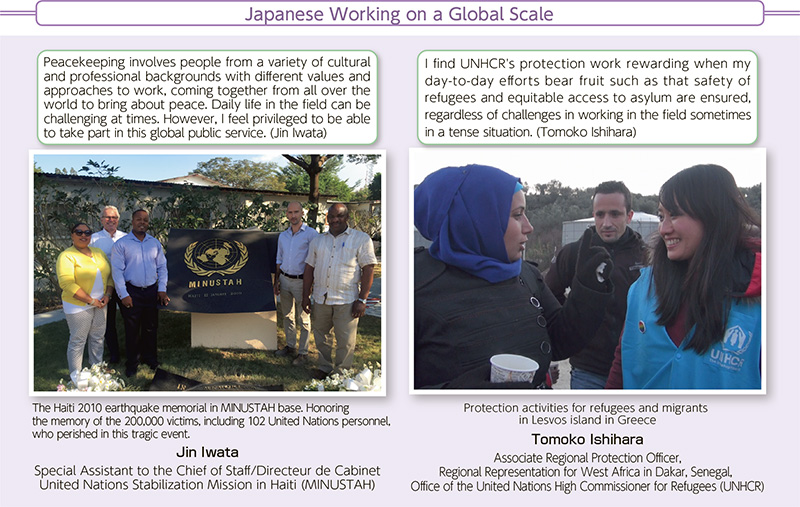
Currently, about 800 Japanese nationals are working as professional staff members in UN-related agencies around the world. The number of Japanese employees have increased by more than 100 since 2000, signifying the expansion of Japan's intellectual and personnel contributions. However, compared to the number of professional staff members of other G7 member countries, which exceed 1,000, Japanese personnel contribution remains insufficient.
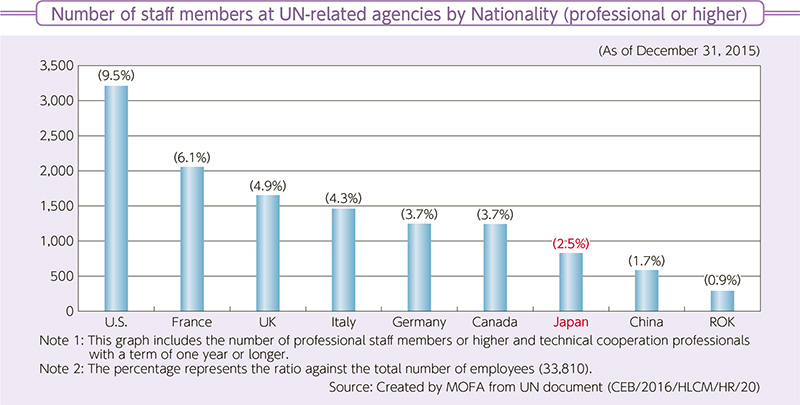
The Government of Japan has set the objective of increasing the number of Japanese employees working at UN-related agencies to 1,000 by 2025. To this end, MOFA is actively recruiting, training, supporting, and providing information in collaboration with universities and related ministries and agencies to Japanese nationals who can play active roles and make a contribution on the global stage. As part of this effort, MOFA has organized guidance sessions to provide information on the process of recruitment by international organizations and hosted Outreach Missions of human resource staff from international organizations visiting Japan.
Furthermore, MOFA also supports young people dispatched to international organizations by strengthening and expanding the Junior Professional Officer Programme (a system of sending young Japanese nationals who aspire to work in international organizations as regular employees for two years in principle to provide them with opportunities to gain necessary knowledge and experience in international organizations and to aim for regular employment after their dispatch). MOFA is also committed to coordination with human resource sections of international organizations, gathering information, providing vacancy information, and supporting application procedures, etc. for the promotion and employment of Japanese staff.
As one of Japan's contributions in the international community, more Japanese people taking on active roles in international organizations are expected to lead to the enhanced presence of Japan. It will also demonstrate how Japan is truly committed to the promotion of peace and prosperity of the world and actively working for it. In addition, Japanese staff of international organizations may play the role of a “bridge” between the international organization and their home country. For example, when Japan cohosted the Tokyo International Conference on African Development (TICAD VI), in 2016 held in Kenya with the United Nations, the UN Development Programme (UNDP) and others, Japanese staff members, who are able to understand the work procedure of both Japan and partner organizations and differences in the way of thinking between them, proved essential in advancing projects and policy issues in a smooth, prompt and efficient manner and their roles were highly appreciated by the international organizations (See Column “The Voices of the People Who Gave Support on the UN Stage”). The presence of Japanese staff in international organization has vital significance also from the perspective of promotion of Japan's diplomatic priorities.
Moreover, increase in the number of Japanese people with various international experiences will in turn lead to enrichment of human resources of Japan, contributing to the development of Japan as a whole.
MOFA will continue to be even more active in undertaking measures to increase the number of Japanese nationals working in international organizations so that competent Japanese nationals who understand the roles and responsibility of international organizations and have high aspiration and passion to contribute to solving the issues faced by the international community can take part in international organizations.
(2) Activities of Non-Governmental Organizations (NGOs)
A Development Assistance
It is estimated that in Japan there are over 400 non-governmental organizations (NGOs) engaged in international cooperation activities. Most of them are familiar with local needs at the grassroots level and provide flexible and detailed support in developing countries / regions with various challenges such as poverty, natural disaster, and conflicts and their importance in development cooperation is increasing.
MOFA provides financial cooperation in the form of grant assistance for economic and social development projects implemented by Japanese NGOs in developing countries/regions (Grant Assistance for Japanese NGO Projects) and actively provides Official Development Assistance (ODA) through NGOs. In FY 2016 (as of end-December), 29 Japanese NGOs implemented 38 Grant Assistance for Japanese NGO Projects in 15 countries in Asia, Africa, the Middle East, etc. The projects cover a wide range of assistance, including, health/medical/hygienic care (maternal and child health, countermeasures for tuberculosis/ HIV/AIDS, water/hygiene, etc.), rural development (environmental development/technological improvement for agriculture), support for the people with disabilities (vocational training/employment assistance, provision of wheelchairs for children, etc.), education (building schools, etc.), disaster risk reduction, and the clearance of landmines and unexploded ordnances (UXO). Moreover, subsidies are provided with the objective of supporting activities that enhance the project execution capabilities and expert skills of Japanese NGOs and promote NGO projects (NGO Project Subsidies).
The Japan Platform (JPF) was established in 2000, with the aim of conducting emergency humanitarian assistance effectively and promptly through cooperation and partnership among the government, NGOs and business communities at the time of refugee crises/large-scale natural disasters. As of the end of December 2016, 46 NGOs are members of JPF. In 2016, JPF launched aid to assist Hurricane “Matthew” disaster victims in Haiti and an Emergency response to Extreme Winter Condition (Dzud) in Mongolia, JPF continuously provided assistance to refugees and internally displaced persons in Syria, Iraq, and their neighboring nations. Humanitarian assistance was also provided to Afghanistan, Yemen, Gaza (Palestine), South Sudan, and Myanmar, etc.
Japanese NGOs conduct a number of activities using contributions from supporters and the income earned from their own business. In recent years, with growing public interest in Corporate Social Responsibility (CSR), an increasing number of companies with technologies and funds implement social action programs-projects in developing countries in partnership with NGOs with much knowledge on development cooperation.
As seen thus far, NGOs assume important roles in the area of development cooperation. Identifying such NGOs as partners in development cooperation, MOFA and JICA provide indirect support for NGO activities through various policy measures with the aim of enhancing their capacity, and expertise as well as developing human resources so that NGOs can strengthen the foundation for their activities and perform further tasks. In 2016, MOFA implemented four projects, namely “NGO Study Group,” “NGO Overseas Study Program,” “NGO Intern Program” and “NGO Consultant Scheme.”
Moreover, the general meeting of the “NGO-MOFA Regular Consultation Meeting” was held in June in order to promote dialogue/coordination with NGOs. Also the ODA Policy Council to discuss overall ODA and the Partnership Promotion Committee to discuss support for NGOs and cooperation measures were held. In addition, MOFA has been working on global-scale issues in the development and humanitarian areas, including the process to adopt the 2030 Agenda for Sustainable Development, exchanging opinions with NGOs.
The UN as a path to building a better world
June Kunugi Special Representative
United Nations Children's Fund (UNICEF), State of Palestine
Working for the United Nations is in my DNA—literally, as my father previously worked for the United Nations in New York, Jerusalem, and Bangkok. Growing up as a foreigner wherever I lived also made me want to dedicate myself towards promoting multicultural understanding and building a more peaceful, equitable, and tolerant world through international partnership.
The 1990 World Summit for Children organized by UNICEF gave me both inspiration and later a career opportunity. As a graduate student, I attended and wrote an article about the Summit for the Asahi Weekly. I was moved by the Summit's message that the means and knowledge exist in the world to protect children and reduce their suffering, and to tackle the challenge of around 40,000 children dying every day from largely preventable causes—diarrhoea, respiratory infections, and malnutrition. What was needed was political will, which is why UNICEF convened the largest gathering of world leaders up to that time, and mobilized their commitment and political will to achieve the goals and plan of action adopted at the Summit.
After graduating in 1991, I was fortunate to get a job with UNICEF, first as a consultant and then as a JPO sponsored by the Government of Japan.
I have worked with UNICEF at headquarters (New York, Tokyo) and field locations (Vietnam, Bangladesh, Oman and the Gulf, Bosnia and Herzegovina, and now Palestine) for over a quarter of a century. I have witnessed significant progress, including in reducing child mortality rates globally through the work of the UN and its partners, enabled by donor partnership and support, with Japan being one of the leaders.
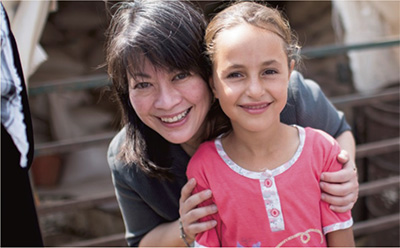 With a girl from the nomadic Bedouin tribe
With a girl from the nomadic Bedouin tribe
I have felt privileged to have been part of the UN, and highly recommend more Japanese people to consider careers in the UN system. The technical expertise and experience Japanese staff contribute are highly appreciated, and in turn they gain unique experience and knowledge that enrich Japanese society and linkages with the rest of the world, building a better future together.
Supporting “Win-Win-Win” TICAD Process
Shigeki Komatsubara, TICAD Programme Adviser
United Nations Development Programme (UNDP)
Over two days in August 2016, in Nairobi Kenya, the Sixth Tokyo International Conference on African Development (TICAD VI), the first TICAD summit on African soil, was held. TICAD VI attracted political and business leaders from Africa and Japan as well as representatives from Europe, Americas, Asia, Civil Society as well as International Organizations, totaling 11,000, proved to be one of the most successful international conferences held in Africa.
UNDP and Japan have much in common in their development perspectives and approaches, such as human centered development, human security, as well as individual and institutional capacity building, and have been working together for the success of the TICAD process since its inception in 1993. TICAD, which brings together key stakeholders from Africa, Japan and global community to discuss African development, is a very unique international endeavor, and it has been making important contributions to global development agenda such as the regional integration, Millennium Development Goals (MDGs) and Sustainable Development Goals (SDGs).
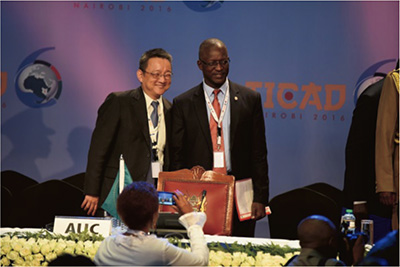 With Kenya's Ambassador Ben Ogutu, Director General of the TICAD VI Secretariat, on the day of the adoption of the TICAD VI Nairobi Declaration
With Kenya's Ambassador Ben Ogutu, Director General of the TICAD VI Secretariat, on the day of the adoption of the TICAD VI Nairobi Declaration
Reflecting the rising interest among Japanese stakeholders in Africa that is achieving steady economic growth, more than 3,000 people participated in TICAD VI from Japan. It was a touching moment to meet again in Nairobi with so many Japanese business leaders with whom I had worked during 11 years at Keidanren (Japan Business Federation) secretariat, before joining UNDP 15 years ago. Since then, I have been consistently working for African development from UNDP headquarters in New York and Ghana country office, and have witnessed Japan and Africa getting ever closer to each other.
TICAD is the “win-win-win” endeavor, contributing to Africa, Japan and the Global Society at the same time. I look forward to welcoming more Japanese colleagues to join the United Nations and enrich it with their experiences and wisdoms.
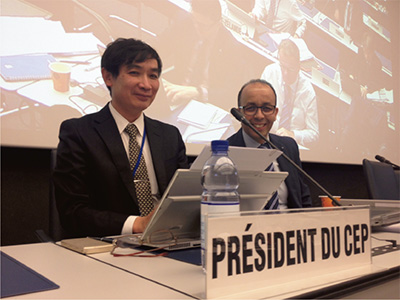 Mr. Metoki (left) with an IB director (right).
Mr. Metoki (left) with an IB director (right).
During the plenary session of the Postal Operations Council (POC) of the Universal Postal Union (UPU) in Berne, Switzerland, the conference room, with a capacity of 200, is filled to the second-floor balcony seats with representatives of the 40 Council members, observers, regional organizations, Secretariat staff members, and others.
The Chairman and about 10 members of the International Bureau, including the Director General, sit in a row on a 60-cm-high podium at the front of the room.
From 2013 to 2016, I chaired a total of eight meetings here. I would look over the conference room, and then declare the meeting open. All eyes would turn to me, and we were seemingly transported to another world for a while.
The proceedings never follow the script. There is not a moment's rest with requests to change the order of proceedings, the absence of the person supposed to explain the agenda items, voting requiring complicated procedures, and untimely statements just as discussions are about to conclude, as well as the need to notify the interpreters and other people concerned when we have to go beyond the scheduled time.
I also made many blunders. For example, I did not notice that a member country right in front of me was requesting to speak. I also mistakenly said 2020 instead of 2012 and was warned by the support staff next to me.
This was what it was like to be in charge of the meeting. Fortunately, Japan was well-received by UPU members as the chair country. I wish to take this opportunity to thank everyone who helped me along the way.
The UPU is an international organization for international mail whose purpose is to guarantee the free circulation of postal items over a single worldwide postal territory composed of interconnected networks. Established in 1874, the UPU is said to be the second oldest international organization worldwide. It became a UN specialized agency in 1947. It currently has 192 member states and areas.
The Congress, the supreme body of the UPU, is held once every four years. Operations between Congresses are carried out by the International Bureau, the Council of Administration (CA; 41 council members) and the Postal Operations Council (POC; responsible for operational matters concerning postal service, 40 council members).
Japan joined the UPU in 1877 and has always been handily elected a member of the POC since its establishment in 1957. It has actively contributed to operational activities, including quality improvement of Express Mail Service (EMS) and the development of a tracking system for international mail, as two specific examples of its cooperation.
Against this background, in order to contribute to the UPU as a way to show gratitude for the condolences and encouragement that we received from other countries on the occasion of the Great East Japan Earthquake and Tsunami, and to emphasize the importance of the public mission of mail as a country struck by disaster, Japan stood for the first time in 2012 as a candidate for the POC chair.
At the Doha Congress in that same year, Japan, as the sole candidate, was elected as the chair country. I was designated to serve as the POC chairman, as I was the director of the International Business Division of Japan Post at the time.
As chairman, I aimed to conduct the proceedings effectively and in a way that everyone, including myself, could understand. Specifically, with the cooperation of member countries and the International Bureau, I was able to achieve results such as making the proceedings visible by displaying the agenda items in English and French at the front of the conference room and expediting decision-making by holding meetings twice a year. Today, they have become standard practice for the UPU.
It was also important to build personal trust with the chairpersons of the committees under the POC that discuss specialized and technical matters.
In January 2013, we held a preparatory meeting in Tokyo to which we invited the committee chairpersons on a voluntary, unofficial basis. All the chairpersons participated and generated an esprit de corps to conduct POC activities together through cross-functional discussions on issues for the POC as a whole.
At the end of the cycle, the committee chairpersons stated one after another that they had gained a solid understanding of the matters that needed to be executed through teamwork at the Tokyo meeting and that they had never experienced anything like that in their long years of activity in the UPU.
With that, I managed to fulfill my duties as the chair. At the Universal Postal Congress in Istanbul, Turkey in October 2016, Japan was elected again as the chair country, and I was designated to serve again as the chairman.
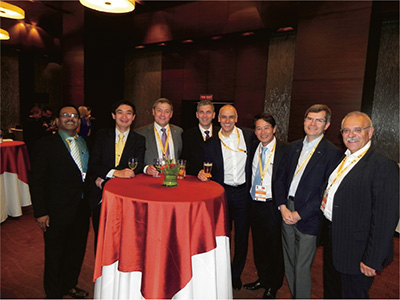 Mr. Metoki (second from the left) with the committee chairs at a regional meeting in New Delhi.
Mr. Metoki (second from the left) with the committee chairs at a regional meeting in New Delhi.
There are several important issues in this cycle as well that require early decisions.
Integrating international postal products, Electronic Advance Data (EAD) of customs information and the development and introduction of products geared to e-commerce are just a few of the issues that are the subject of major controversy from legal and technical perspectives. I intend to use my previous experience as the chair to hold efficient and effective discussions.
In this new four-year cycle, I hope to be able to look around the conference room in a little more relaxed manner.
B Partnership in Other Major Diplomatic Areas
MOFA also cooperates with NGOs in areas other than development cooperation. For instance, at the 60th session of the UN Commission on the Status of Women (CSW) held in March, Ms. Hiroko Hashimoto (professor emeritus of Jumonji University and principal of Jumonji Junior/ Senior High School) represented Japan, and NGO representatives actively participated in discussions as members of the Japanese delegation. At the 71th UN General Assembly, Ms. Yasue Nunoshiba (professor of Bunkyo University) attended the Third Committee, which deals with a range of social and human rights issues, as an advisor to the representatives of the Government of Japan. In addition, the Government of Japan has initiated dialogues with civil society including NGO representatives and experts on matters related to government reports to be submitted based on various conventions on human rights, third country resettlement projects, and the National Action Plan on Women, Peace and Security based on the UN Security Council (UNSC) Resolution 1325 and related resolutions.
Japanese NGOs are also increasing their presence in the area of disarmament, and MOFA has been actively promoting cooperation with NGOs in the area of conventional weapons, for example, participation of MOFA officials in seminars hosted by NGOs, cooperation in clearance of mines and unexploded ordnances, and risk reduction education projects.
Furthermore, in the area of nuclear disarmament, MOFA has been conducting dialogues with various NGOs and experts. The Government supports the activities of NGOs and others to convey atomic bomb survivors' testimonies on the realities of the disaster of the use of nuclear weapons to the international community through the commissioned projects called “the Special Communicator for a World without Nuclear Weapons” and “the Youth Communicator for a World without Nuclear Weapons.” As of December, a total of 262 Special Communicators on 83 occasions and a total of 174 Youth Communicators on 18 occasions have been dispatched to the world through these commission programs.
As for the measures against transnational organized crime, especially in the area of trafficking in persons, coordination with civil society including NGOs is essential. With this in mind, the government actively exchanges opinions with NGOs and other stakeholders to identify recent trends of trafficking in persons and to consult appropriate measures to address them.
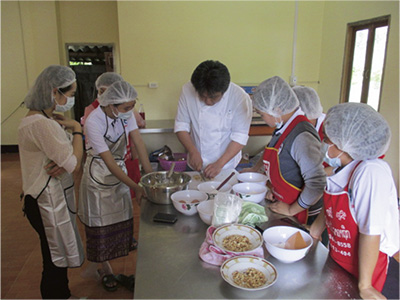 Creating a Place for the Handicapped to Work in Houaphanh Province, Laos(Grant Assistance for Japanese NGO Projects Photo: Asian Development with Disabled Persons (ADDP Japan; specified non-profit organization))
Creating a Place for the Handicapped to Work in Houaphanh Province, Laos(Grant Assistance for Japanese NGO Projects Photo: Asian Development with Disabled Persons (ADDP Japan; specified non-profit organization))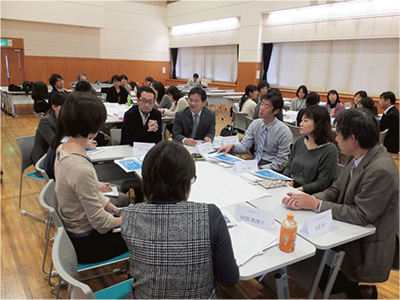 The Second FY2016 NGO Consultants Liaison Meeting (November 28, Okayama Prefecture)
The Second FY2016 NGO Consultants Liaison Meeting (November 28, Okayama Prefecture)(3) Japan Overseas Cooperation Volunteers (JOCV) and Senior Volunteers (SV)
The Japan Overseas Cooperation Volunteers (JOCV) is a Japan International Cooperation Agency (JICA) program aimed at cooperation/assistance for the economic and social development of the communities of the developing countries where young skilled people aged 20 to 39 live and work together with local people in these countries, fostering mutual understanding. As of end-November 2016, 42,094 JOCVs had been dispatched to 88 countries in total. Dispatched members have been engaged in about 200 types of work in nine areas: planning administration, commercial/tourism, public utility works, human resources, agriculture, forestry and fisheries, health/medical care, mining, social welfare and energy.
In July 2016, JOCV, which was established in 1965 and celebrated its 50th anniversary in 2015, received the Philippines' Ramon Magsaysay Award1, otherwise known as the Asian Nobel Prize. JOCV is highly regarded by developing countries as representing the “Visibility of Japanese Development Cooperation.”
In 2016, in addition to countries where JOCVs had been dispatched, Japan concluded an agreement with Myanmar concerning the dispatch of volunteers under the JOCV program and an agreement with Lesotho on technical cooperation including JOCV.
The Senior Volunteers (SV) program is a program to dispatch middle aged persons from 40 to 69 years of age who have wide-ranging skills and rich experiences to developing countries. The program has been expanding every year since its foundation in 1990. By the end of November 2016, a total of 6,047 volunteers had been dispatched to 74 countries, and cooperated in nine areas, the same as the JOCV program. The SV program has drawn increasing interest in recent years from the perspective of supporting to start a new life after retirement and utilizing the rich experiences and expertise of retired senior citizens.
JOCV and SV programs are supported by the high aspirations of people who are keen to provide cooperation for the sake of economic and social development and reconstruction of developing countries. MOFA actively promotes these programs, considering them as a core of participatory international cooperation by citizens. As of end-November 2016, 2,044 JOCVs and 391 SVs are working around the world (69 countries and 58 countries, respectively). The volunteer participants who have returned to Japan contribute to Japanese society by sharing their experiences in educational and local activity settings and private companies. These unique participatory activities of Japan are highly appreciated and expected both domestically and internationally, including in recipient countries.
Experiences gained from JOCV/SV programs can lead to the personal development of the participants as human resources who will make a positive impact on the global arena. Thus, the government is working with companies, municipal governments and universities which need such opportunities to develop human resources through the dispatch of their employees, teachers and students to developing countries. This could lead to expand the participants from a broad range of areas. For instance, as a program responding to the needs of private companies, such as small-and medium-sized enterprises, aiming for international development of their businesses, the government launched the “Private-Sector Partnership Volunteer” program in FY2012. Furthermore, the government is committed to developing an environment where returned JOCVs and SVs can feed back their experiences into society, including employment support. Returned volunteers are active in many fields inside and outside Japan. Some have been hired by the Reconstruction Agency to work as additional personnel for disaster-stricken local governments, utilizing their own specialties and experience gained in JOCV/ SV programs. Some keep on supporting the countries where they were dispatched with other returned volunteers, others work for international organizations.
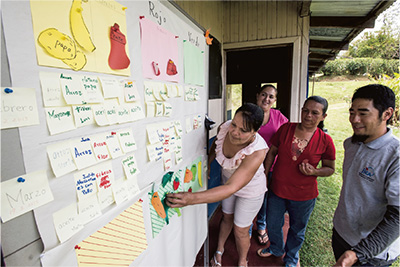 A volunteer from the Japan Overseas Cooperation Volunteers (JOCV) giving advice on life improvement in Costa Rica (Photo: Kenshiro Imamura/JICA)
A volunteer from the Japan Overseas Cooperation Volunteers (JOCV) giving advice on life improvement in Costa Rica (Photo: Kenshiro Imamura/JICA)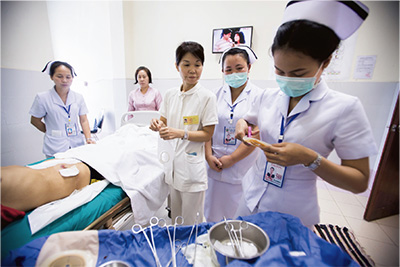 A member from the Senior Volunteers (SV) working as a nurse at a hospital in Laos (Photo: Shinichi Kuno/ JICA)
A member from the Senior Volunteers (SV) working as a nurse at a hospital in Laos (Photo: Shinichi Kuno/ JICA)- 1 Established to commemorate President Ramon Magsaysay of the Philippines, the Ramon Magsaysay Award is awarded each year by the Ramon Magsaysay Award Foundation located in Manila City to an individual or organization that has produced exemplary results in Asia through contributions to society, etc.


